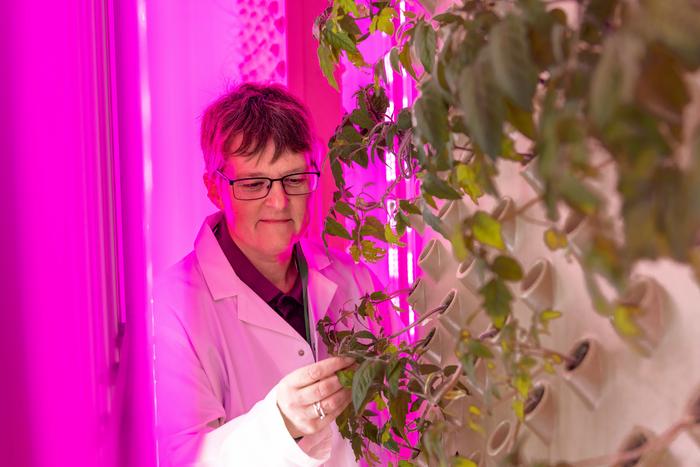A unique $3.7m plant lab will put researchers on the frontline in the fight against climate change and create crops for “tomorrow’s atmosphere today”.

Credit: University of Essex
A unique $3.7m plant lab will put researchers on the frontline in the fight against climate change and create crops for “tomorrow’s atmosphere today”.
The new flagship facility at the University of Essex will allow scientists to adapt plants for a hotter drier planet as food security is increasingly threatened.
It boasts a cutting-edge commercially standard vertical farm, an indoor field that replicates real environments anywhere in the globe, and suites that imitate a warming world – with researchers able to raise CO2 concentration and temperature levels at will.
Computer plant scanning technology will also be used to monitor plants as they grow – and pinpoint precise changes in photosynthesis.
The research will be underpinned by AI and robotics that will develop new ideas, technologies, and strategies to predict how agriculture and the natural world are changing.
With the human population expected to reach 9.7 billion by 2050, a step-change in agricultural productivity, sustainability and resilience is needed to keep up with food demand.
‘Secure everyone’s future’
World-leading biologist Professor Tracy Lawson is spearheading the project, which builds on her decades of pioneering work into plant productivity, improving photosynthetic process and boosting crop water use.
Professor Lawson said: “This amazing facility places plant research at Essex in a unique position to be able to grow and select plants for tomorrow’s atmosphere today.
“This cutting-edge lab will put us at the forefront of research into how we can help plants change and adapt to climate change – helping secure everyone’s future.
“This state-of-the-art facility will help the world cope with a growing population by ensuring future food security by developing climate resilient plants.”
The University will be the first in the UK to have a commercial standard vertical farm and is the only lab in the nation to combine all the facilities.
The Smart Technology Experimental Plant Suite (STEPS) facility will develop strategies to optimise plant performance whilst working towards net zero.
And will allow researchers to foster connections in the community and develop relationships in agriculture, horticulture, and technology businesses.
Pioneering
It builds on the work of the influential and pioneering Essex Plant Innovation Centre (EPIC).
EPIC brings farmers, technologists, and scientists together to improve the resilience of crops to drought, increase yields and secure the food chain during extreme weather scenarios.
Students will be at the forefront of the work helping develop and conduct experiments with the University’s internationally renowned researchers, as well as providing a unique undergraduate experience and training opportunity.
Young scientists will now be able to begin their careers in a cutting-edge facility unique to Essex.
The STEPS lab was part funded by the Wolfson Foundation who pledged $1.2million to support its development.
‘Race against time’
Paul Ramsbottom, chief executive of the Wolfson Foundation, said: “We are in a race against time to futureproof agriculture against climate change, not just in the UK but globally.
“The University of Essex is leading the way in critical research and development to support innovation and sustainability in food production, and we are delighted to be funding the technology platforms that will help them achieve this.”
This project will include long-time industry collaborator Innovation Agritech Group (IAG).
The British company installed the commercial standard vertical farm unit, deploying a full scale GrowFrame360 – which is unique to UK universities.
Kate Brunswick, Business Development Director at IAG, said: “We are honoured to join forces with the University of Essex and the Wolfson Foundation in launching the first commercial vertical farm within a UK university.
“This milestone collaboration embodies our collective dedication to driving positive change in agriculture.
“Our innovative GrowFrame360 technology will empower scientists and students alike to tackle the complexities of a changing climate on future crop production, aiming for future food security.
“We eagerly anticipate the transformative impact this facility will have on agricultural resilience and productivity.”



